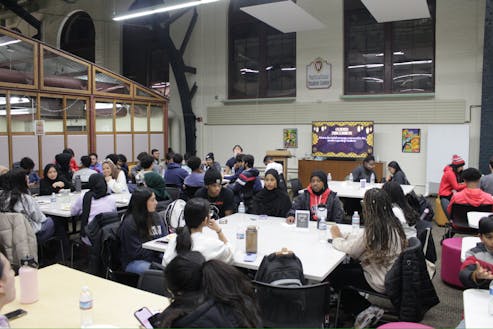As the sun began to set, students and faculty gathered in the University of Wisconsin-Madison’s Red Gym awaiting the beginning of iftar. When the sun set, a hush fell over the room as a prayer was called out, and attendees broke their fast with sweet dates followed by group prayer.
The room was filled with laughter and cheers when brothers of the Gamma Epsilon Chapter of Alpha Phi Alpha, the oldest intercollegiate African American fraternity, carried curry, samosas and rice into the room to celebrate iftar during an event held April 2.
The gathering aimed to provide a space for students, faculty members and staff to come together and share in the ritual of iftar, the fast-breaking meal of Muslims during the holy month of Ramadan, the ninth month of the Islamic calendar. The month is observed by Muslims worldwide as a month of fasting, prayer, reflection and community.
Gamma Epsilon leaders said they wanted to encapsulate community by inviting individuals from diverse backgrounds to partake in the iftar meal and engage in meaningful conversations about Ramadan and Islam.
Leaders hosted the event in the Multicultural Student Center lounge and began with attendees breaking their fast together with dates, fruits and prayer. The Gamma Epsilon chapter then provided attendees a meal and led a guided roundtable discussion.
Zuheb Ibrahim, the director of educational activities for Alpha Phi Alpha at UW-Madison, said providing a space for students to break their fast together is impactful.

"The biggest impact it has is giving students a space to not only be together but also break their fast together," Ibrahim said. "Like many, there's a big disconnect between food resources and students on campus. So organizations being able to provide a meal for students is a big plus."
Attendees like Azza Bayoudh, a UW-Madison student, echoed this sentiment. Bayoudh said it’s helpful to find belonging on campus during Ramadan.
“It's really nice because a lot of people are spending Ramadan away from home, and it can be hard for people to be away from their family and friends and routine,” Bayoudh said. “It's nice to have like a community where a lot of Muslims can get together and eat and break fast together.”
Olakunle Ojo, a member of the Gamma Epsilon chapter, said iftar is open to students and faculty members of all religious backgrounds. Ojo said he hopes people will participate in the breaking of fast and engage in meaningful discussions.
“I feel like this event gives them a space to converse and talk about issues that they have faced on campus," said Ojo. “The event isn't just for Muslim students that want to learn and work to create change.”
The Muslim Student Association keeps a regularly updated flier of campus iftars on its Instagram account. The Muslim-majority registered student organizations are working together to host an iftar on Monday, Tuesday, Wednesday and Thursday during every week of Ramadan, according to the Center for Campus Interfaith.
Amari Mbongwo is the community outreach coordinator for The Daily Cardinal. She has also written in-depth for campus news.






